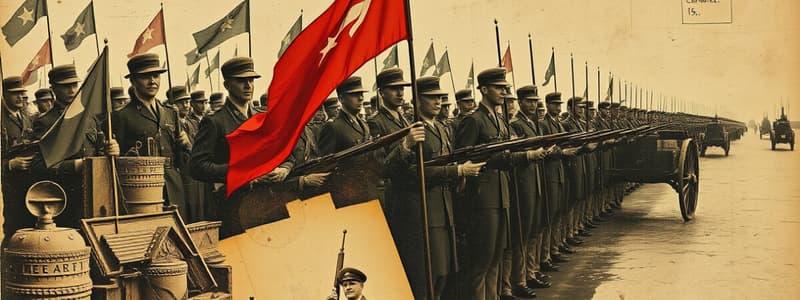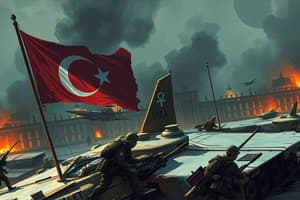Podcast
Questions and Answers
Which is not an accurate description of the role nationalism played in causing World War I?
Which is not an accurate description of the role nationalism played in causing World War I?
- It united Europe against the Ottoman Empire. (correct)
- It led to the creation of new nation-states.
- It fostered a spirit of competition among European nations.
- It caused unrest in multi-ethnic empires.
Which describes the effect of militarism in the years leading up to World War I?
Which describes the effect of militarism in the years leading up to World War I?
- Nations drastically reduced their military expenditures.
- Neutral countries formed alliances.
- Only one nation prepared for war.
- Countries built large armies and stockpiled powerful weapons. (correct)
Which two countries did not ally with each other prior to World War I?
Which two countries did not ally with each other prior to World War I?
- Italy and Austria-Hungary
- France and Russia
- Germany and Austria-Hungary
- Britain and Germany (correct)
Which best describes the difference between expectations for World War I and the reality of the war?
Which best describes the difference between expectations for World War I and the reality of the war?
What is a total war?
What is a total war?
What change occurred during World War I as a result of total war?
What change occurred during World War I as a result of total war?
What event helped convince the United States to enter World War I?
What event helped convince the United States to enter World War I?
What resulted after the United States entered World War I?
What resulted after the United States entered World War I?
Which was not a change Woodrow Wilson called for in his Fourteen Points?
Which was not a change Woodrow Wilson called for in his Fourteen Points?
Which best describes the costs of World War I?
Which best describes the costs of World War I?
Which does not accurately describe the Treaty of Versailles?
Which does not accurately describe the Treaty of Versailles?
What was Vladimir Lenin's vision for Russia?
What was Vladimir Lenin's vision for Russia?
Which tactic did Vladimir Lenin not employ following the Russian Revolution?
Which tactic did Vladimir Lenin not employ following the Russian Revolution?
What was an effect of the Russian Revolution on World War I?
What was an effect of the Russian Revolution on World War I?
What was the purpose of Stalin's Five-Year Plans for Russia?
What was the purpose of Stalin's Five-Year Plans for Russia?
What phrase did Gandhi use to explain his philosophy of nonviolent civil disobedience?
What phrase did Gandhi use to explain his philosophy of nonviolent civil disobedience?
What was a goal of the Muslim Brotherhood in post-World War I Egypt?
What was a goal of the Muslim Brotherhood in post-World War I Egypt?
What best describes the role of Zionism in ongoing Middle East tensions?
What best describes the role of Zionism in ongoing Middle East tensions?
Which was not a change that occurred in U.S. society during the 1920s?
Which was not a change that occurred in U.S. society during the 1920s?
Which was not a direct cause of the Great Depression?
Which was not a direct cause of the Great Depression?
What best describes the New Deal?
What best describes the New Deal?
In which way are communism and fascism alike?
In which way are communism and fascism alike?
Which is true about fascism but is not true about communism?
Which is true about fascism but is not true about communism?
What best describes Hitler's beliefs as expressed in Mein Kampf?
What best describes Hitler's beliefs as expressed in Mein Kampf?
Which revolutionary leader would be most likely to have said the quote about bravery and nonviolence?
Which revolutionary leader would be most likely to have said the quote about bravery and nonviolence?
Which revolutionary leader would be most likely to have said the quote regarding the growing workers' revolutionary movement?
Which revolutionary leader would be most likely to have said the quote regarding the growing workers' revolutionary movement?
Study Notes
World War I Causes and Nature
- Nationalism contributed to World War I by uniting European nations against the Ottoman Empire.
- Militarism led to countries amassing large armies and modern weaponry.
- Britain and Germany did not form alliances before the war.
- Initial expectations for a swift victory contrasted with the grim reality of prolonged trench warfare.
Characteristics of Total War
- Total war involves mobilizing every citizen and resource for the conflict.
- During World War I, planned economies emerged as a response to total war, replacing free market capitalism.
U.S. Involvement in World War I
- The sinking of the Lusitania played a critical role in persuading the United States to join the Allies.
- U.S. entry into the war contributed to the collapse of the German offensive.
Treaty of Versailles and Post-War Effects
- Woodrow Wilson's Fourteen Points excluded demands for stricter control over colonies.
- World War I resulted in immense human loss and devastated European economies.
- The Treaty of Versailles did not establish lasting peace.
Russian Revolution and Communism
- Vladimir Lenin envisioned a government led by professional revolutionaries for the working class.
- After the Russian Revolution, Lenin did not seek an alliance with Germany.
- The Russian Revolution resulted in a humiliating defeat of Russia by Germany during the war.
Stalin's Economic Policies
- Stalin's Five-Year Plans aimed at rapidly increasing industrial output in Russia.
Gandhi's Philosophy
- Gandhi promoted nonviolent civil disobedience through the concept of suffering without retaliation.
Post-War Egypt and Middle East Conflicts
- The Muslim Brotherhood sought complete Islamic governance in post-World War I Egypt.
- Zionism intensified tensions between Arabs and Jews over territorial claims in the Holy Land.
Societal Changes in the U.S. During the 1920s
- The 1920s in the U.S. saw no decrease in factory production as a notable change.
- The Great Depression had various causes, but mass production was not one of them.
The New Deal
- The New Deal encompassed a series of government programs intended to revive the U.S. economy during the Great Depression.
Political Ideologies: Communism vs. Fascism
- Both communism and fascism suppress political freedoms but differ in property ownership; fascism allows private ownership.
- Adolf Hitler's ideology, as articulated in Mein Kampf, emphasized the supremacy of the "master race."
Quotes from Influential Leaders
- Gandhi extolled virtues of courage and the absence of malice in true bravery.
- Lenin expressed confidence about the eventual victory of the revolutionary movement despite ongoing violence against workers.
Studying That Suits You
Use AI to generate personalized quizzes and flashcards to suit your learning preferences.
Description
Test your knowledge on the role of nationalism and militarism in World War I with this comprehensive quiz. The questions delve into historical events and their implications leading to the war, providing a robust understanding of this crucial period in history.




